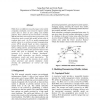Free Online Productivity Tools
i2Speak
i2Symbol
i2OCR
iTex2Img
iWeb2Print
iWeb2Shot
i2Type
iPdf2Split
iPdf2Merge
i2Bopomofo
i2Arabic
i2Style
i2Image
i2PDF
iLatex2Rtf
Sci2ools
108
click to vote
MASCOTS
2001
2001
Parameterized Mobile Action Generator for a Wireless PCS Network
While there are different research groups in the mobile computing community, most research requires mobile action data in terms of user calling and mobility patterns. Since collection of such real data is currently difficult and since most activity data is proprietary [12], researchers need to model this mobile activity data to evaluate their work. In [9] we model parameterized mobile actions in a wireless personal communication service (PCS) network based on three components: human behavioral daily movements cycle (traffic and labor), calling patterns, and topological localities. We have developed a mobile action generator based on the model. Our goal in designing the mobile action generator is to provide a common "benchmark" through which researchers can directly exchange performance results and avoid inaccuracies. We describe our model and the structure of our mobile action generator and present simulation results showing the performance of several call setup protocols.
Related Content
| Added | 31 Oct 2010 |
| Updated | 31 Oct 2010 |
| Type | Conference |
| Year | 2001 |
| Where | MASCOTS |
| Authors | Sang-Eon Park, Carla N. Purdy |
Comments (0)

